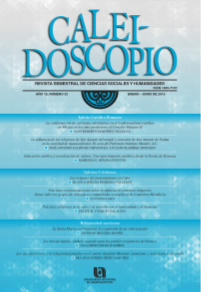Catholic education and socialization of values. An analytical approach based on Systems Theory
DOI:
https://doi.org/10.33064/32crscsh551Keywords:
theory, catholic education, socialization, moral valuesAbstract
Academic debates regarding systems theory are usually developed on an abstract basis, from which arises a difficulty when evaluating its usefulness to analyze empirical problems. This article is basically an exercise to prove its relevance, by outlining a research on the socialization of moral values in schools. The general hypothesis guiding this inquiry is that the students express moral communications, which are differentiated by the kind of school they attend; classified as lay or catholic. The following text exemplifies the construction of a research problem through the kinds of social systems proposed by Niklas Luhmann: a) functional, in which we can identify the religious and the educational systems; b) organizations, in which we can identify schools; and c) interactions, which in this case are developed among the students and among them and the researcher, and through which the students express their moral values.Downloads
Downloads
Published
How to Cite
Issue
Section
License
Licencia Creative Commons Atribución-NoComercial-CompartirIgual 4.0 Internacional
El lector es libre de compartir o adaptar el material en cualquier medio o formato bajo las condiciones siguientes: (a) debe reconocer adecuadamente la autoría, proporcionar un enlace a la licencia e indicar si se han realizado cambios; (b) no puede utilizar el material para una finalidad comercial y (c) si remezcla, transforma o crea a partir del material, deberá difundir sus contribuciones bajo la misma licencia que el original.
Resumen de la licencia
https://creativecommons.org/licenses/by-nc-sa/4.0/deed.es_ES
Texto completo de la licencia
https://creativecommons.org/licenses/by-nc-sa/4.0/legalcode
Cada autor es responsable del contenido de su artículo. En el caso de un texto colectivo, el primer autor asume la responsabilidad intelectual de los resultados del proceso editorial; los autores son responsables de obtener la licencia de autor para reproducir materiales gráficos o fotográficos que pertenecen a terceros.
Los autores asumen plena responsabilidad en el caso de falsificación de datos o falta de autenticidad en la investigación. Se comprometen, también, a no reutilizar trabajos ya publicados, total o parcialmente, para presentarlos en otra publicación.
Estas condiciones aplican tanto a la versión impresa como a la versión electrónica de la revista.


















